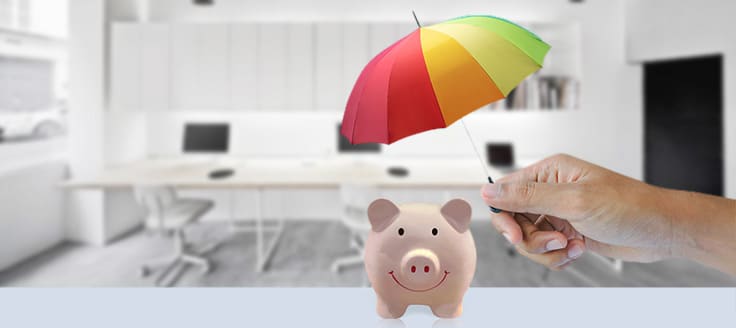Choosing the right business insurance has always been an important part of running a business. Whether you choose to cover yourself against all eventualities, or just want to meet the minimum legal requirements for your industry, you need to know a few vital insurance facts before you can decide what to buy.
Small Business Insurance
Business insurance is designed to protect a business from losses brought about during the normal course of business. This can include protection from litigation, damage to a client’s business or property, damage to the business premises (including specific events like flooding), and more. Smaller businesses are especially at risk of lawsuits and other sudden expenses.
Types of Business Insurance
This term covers every type of insurance a business of any type could possibly need. Yes, that’s quite a lot of different kinds of insurance! Insurers frequently offer combination policies aimed at providing an off-the-peg solution that will suit most small and medium-sized businesses. Business owner policies and commercial lines insurance are the most common combination policy for SMEs, and they come in many forms, targeting specific industries and business types.
Business Owner Policies
A standard business owner policy (BOP) usually includes 5 main types of coverage — business liability insurance, property insurance, business income (sometimes business interruption) insurance, business auto insurance and worker’s compensation insurance. Business owner policies can be adjusted to better suit your needs by adding protection against specific risks that aren’t listed in the core policy – something to talk to your insurance broker about.
The risks covered vary from insurer to insurer. Some insurers will offer one or more “special” BOPs aimed at serving specific markets (e.g. home workers, garage owners, shopkeepers), and these will have extended coverage aimed at protecting business owners from risks that are inherent to those markets.
For example, a BOP aimed at someone who works from home might include coverage that protects them from problems arising from clients visiting their home address. A BOP aimed at shop owners might include protection against robbery and theft, and against losses due to counterfeit money.
There will be certain conditions associated with each part of your new BOP. For instance, counterfeit money protection will probably require the use of some method for detecting counterfeit cash (e.g. ultraviolet light). Make sure you follow these conditions to the letter to protect your coverage.
Liability Insurance
What is general liability insurance for small businesses? It protects your business against the cost of being sued. The exact details of this policy will vary depending on your industry, as will the recommended amount of coverage. Things like errors of judgment, hazardous operating procedures or selling a defective or dangerous product can all lead to damages claims.
Your liability insurance will also help cover the cost of legally defending your business against any claim, regardless of fault. If you lose your case, your professional liability insurance will pay the damages your business is found liable for, including medical costs and the cost of replacement goods.
Property Insurance
Property insurance protects your business premises and equipment against losses due to fire, theft and other causes. The exact details of what is covered and which types of incidents are covered against will vary.
For example, by extending your business property insurance you could choose to protect equipment from breakdown, or add coverage for portable equipment (such as laptops) to protect them while they’re off your business’s premises.
Business Auto Insurance
This is vital if your business owns any vehicles. This type of policy will cover you if one of your vehicles causes damage or is damaged in an accident.
Business Income/Interruption Insurance
For many smaller enterprises, loss of income due to accident or illness could be enough to cause them to fold. Ongoing expenses such as payments to suppliers, employee wages and rent on business premises don’t go away if an unpredictable incident forces you to stop trading for a time. In fact, these costs can soon stack up, making business income insurance an essential part of any BOP.
Workers’ Compensation Insurance
Workers’ compensation usually covers medical treatment for employees’ work-related illnesses or injuries (including mental), as well as covering a portion of lost wages for any injured employee, regardless of who caused the injury. If an employee dies, their family is paid a set amount of compensation out of this policy. Where very small businesses may not need workers compensation, it is compulsory in most states if you have more than a certain number of employees.
Commercial Lines Insurance
Commercial lines insurance covers the cost of anything that may affect the smooth running of the economy or any covered business. It does this by covering businesses against accidents, lawsuits, natural disasters and other adverse events that could cause large financial losses.
Malpractice insurance, workers’ compensation insurance, commercial auto insurance, fire and flood insurance and more all come under this heading. It’s important to know how to decide when to get a BOP, and when to get commercial lines insurance — your insurance broker will be able to advise you.
Data Breach Insurance
These days, the cost of a data breach can reach an average of $242 per breached record, according to IBM. This can soon add up to total costs of millions or even billions of dollars per data breach — a cost few companies can afford to absorb. However, companies can now protect themselves from these costs with data breach insurance.
Commercial Umbrella Insurance
If you have litigation or other costs that exceed what your other insurance policies cover, then commercial umbrella insurance will cover the difference up to the insured amount.
Home-Based Business Insurance
The cost of running your business from home can seem low, but if you have clients visiting your home for work purposes, you will need to protect yourself from litigation. You might also need additional protection for your equipment and inventory that your standard home insurance doesn’t cover.
Product Liability Insurance
If you sell a physical product, product liability insurance will protect you from costs related to your product causing injury or other damage to anyone. This could be due to faulty workmanship, problems inherent in the design or anything else. No matter why your product is alleged to have caused losses, this insurance will protect you.
Other Types of Insurance
There are probably as many different types of insurance as there are fish in the sea. Speak to a business advisor or insurance broker if you need to know about insurance to protect you from any type of loss. Many insurance companies will create insurance for specific reasons if they don’t already insure against a particular event. No matter how unusual your request, you should talk it over with your advisor.

Business Insurance FAQs
Why do we need business insurance?
Some business insurance is required by law, and some is recommended by common sense. Each state has different requirements, but in general most states demand that you have employee compensation insurance if you employ anyone, and commercial auto insurance if your company owns any vehicles. Of course, you’ll need to check what the rules are for the state where your business is located.
Common sense dictates that you also have business liability insurance. Less risky industries will pay smaller premiums, and we’ve all heard stories of litigation leading to huge payouts. Without insurance, you could personally end up liable for these amounts.
You also need business insurance to protect your business from surprise out-of-pocket expenses. Insuring essential equipment against breakdown, or business laptops against damage in transit, comes under this heading. Having to pay for unexpected repairs or replace equipment might seriously affect your cash flow.
How much does business insurance cost?
This is something that will vary depending on your location and type of business, plus what you want covered. The good news is that a basic BOP is often relatively cheap, with typical premiums ranging from $500 to $3,500 per year. With an average cost of $1,200 per year, most businesses can afford to cover themselves.
Workers’ compensation insurance can be expensive if you’re active in certain high-risk industries. The rate you pay is set by the state, but businesses with a history of loss can pay as much as 5 times the basic rate. If employees take part in construction work in your industry, the basic rate can be pretty high. A contractor in the construction sector might pay premiums that are 30 times as much as those of an office-based business with the same number of employees.
Additionally, the laws on workers’ compensation policies can vary greatly from state to state. Some states make workers’ compensation insurance compulsory if you have even 1 employee, while others only make it a requirement for non-construction businesses with more than 4 employees.
How do I work out the level of insurance I need?
You’ll need to know a few important figures before you apply for insurance — annual turnover, employee job type and wages, plus vehicle type and business mileage for any motor vehicles your business owns. In addition, you’ll need to have a list of any equipment you want to specifically protect, along with its current value and replacement cost.
You’ll also need to know how much insurance coverage you want to apply for. If you’re unsure about any of this, your business advisor or insurance broker can help you work out what you need. For instance, the amount of income protection you need might be more or less than your regular business income (you’ll need to be able to cover any insurance premiums out of it as well as keep your business running!).
What type of insurance does my business need?
Obviously, you will need to meet state requirements for business insurance. This means you’ll need employee compensation insurance if you have employees, and commercial auto insurance if your business owns any vehicles. Beyond this, it makes sense to protect your business from litigation and sudden income loss. This is why business owner policies are so popular.
Of course, if your business is over a certain size or isn’t the right type, you might not be eligible for a BOP. In this case, you should think about commercial lines insurance. No matter how unusual your business structure, there will be an insurer willing to cover you. Many insurers will have pre-packaged BOPs or commercial lines insurance aimed at particular types of businesses.
How can I save money on business insurance?
While some insurance is compulsory, with rates set by the state, a lot of it isn’t. In general, you can save money by buying pre-packaged insurance — such as a BOP — rather than separately purchasing each type of business insurance.
Also, if there are any trade organizations or other official bodies related to your business type, they might offer special discounts to members. These policies will be especially well tailored to your business type.
How can I be sure my insurance will pay out if I make a claim?
We’ve all heard horror stories about insurance companies refusing to pay out for a claim. The best way to make sure this doesn’t happen with your business insurance is to carefully read the terms and conditions, both before you make a purchase, and before you make any claim.
There are a lot of things to consider when buying business insurance, so it’s important to take time to learn about the different options before you spend any money. Make sure you check out reviews on your chosen insurer, and take the time to work out exactly how much cover you need.
Your insurance broker or business advisor should be able to help you with any questions about business insurance. If possible, choose one with experience in your industry and state to get the best possible advice. Insurance is one of the best ways to protect the time and money you’ve invested in your business, so make sure your policy effectively protects you.










